- Home
- John Barth
Letters Page 2
Letters Read online
Page 2
Briefly, briefly. The tiny history of “Redneck Tech” has been a seven-year battle between the most conservative elements in the state—principally local, for, as you know, Mason and Dixon’s line may be said to run north and south in Maryland, up Chesapeake Bay, and the Eastern Shore is more Southern than Virginia—and the most “liberal” (mainly not native, as the natives do not fail to remark), who in higher latitudes would be adjudged cautious moderates at best. The original college was endowed by a local philanthropist, now deceased: an excellent gentleman whose fortune, marvellous to tell, derived from pickles… and whose politics were so Tory that, going quite crackers in his final years, the dear fellow fancied himself to be, not Napoleon, but George III, still fighting the American Revolution as his “saner” neighbours still refight your Civil War. His Majesty’s board of trustees was composed exclusively of his relatives, friends, and business associates—several of whom, however, were of more progressive tendencies, and sufficiently influential in this Border State to have some effect on the affairs of the institution even after it joined the state university complex. Indeed, it was they who pressed most vigorously, against much opposition, to bring the college under state administration in the first place, hoping thereby to rescue it from parochial reaction; and the president of the college during these first stages of its history was a man of respectable academic credentials and reasonably liberal opinions, their appointee: the historian Joseph Morgan.
To console the Tories, however, one John Schott—formerly head of a nearby teachers college and a locally famous right-winger—was appointed provost of the Faculty of Letters and vice-president of (what now was awkwardly denominated) Marshyhope State University College. A power struggle ensued at once, for Dr Schott is as politically ambitious as he is ideologically conservative, and had readily accepted what might seem a less prestigious post because he foresaw, correctly, that MSUC was destined for gigantic expansion, and he sensed, again correctly, opportunity in the local resentment against its “liberal” administration.
In the years thereafter, every forward-looking proposal of President Morgan’s, from extending visitation privileges in the residence halls to defending a professor’s right to lecture upon the history of revolution, was opposed not only by conservative faculty and directors of the Tidewater Foundation (as the original college’s board of trustees renamed itself) but by the regional press, state legislators, and county officials, all of whom cited Schott in support of their position. The wonder is that Morgan survived for even a few semesters in the face of such harassment, especially when his critics found their Sweet Singer in the person of one A. B. Cook VI, self-styled Laureate of Maryland, of whom alas more later—I daresay you know of that formidable charlatan and his mind-abrading doggerel, e.g.:
Fight, Marylanders, nail and tooth,
For John Schott and his Tow’r of Truth, etc.
Which same tower, presently under construction, was the gentle Morgan’s undoing. He had—aided by the reasonabler T.F. trustees, more enlightened state legislators, and that saving remnant of civilised folk tied by family history and personal sentiment to the shire of their birth—managed after all to weather storms of criticism and effect some modest improvements in the quality of instruction at Marshyhope. Moreover, despite grave misgivings about academic gigantism, Morgan believed that the only hope for real education in such surroundings was to make the college the largest institutional and economic entity in the area, and so had led the successful negotiation to make Marshyhope a university centre: not a replica of the state university’s vast campus on the mainland, but a smaller, well-funded research centre for outstanding undergraduate and postgraduate students from throughout the university system: academically rigorous, but loosely structured and cross-disciplinary. So evident were the economic blessings of this coup to nearly everyone in the area, Morgan’s critics were reduced to grumbling about the radical effects that an influx of some seven thousand “outsiders” was bound to have on the Dorset Way of Life—and Schott & Co. were obliged to seek fresh ground for their attack.
They found it in the Tower of Truth. If the old isolation of Dorchester was to be sacrificed any road on the altar of economic progress (so their argument ran), why stop at seven thousand students—a kind of academic elite at that, more than likely long-haired radicals from Baltimore or even farther north? Why not open the doors to all our tidewater sons and daughters, up to the number of, say, seven times seven thousand? Fill in sevenfold more marshy acreage; make seven times over the fortunes of wetland realtors and building contractors; septuple the jobs available to Dorchester’s labour force; build on Redmans Neck a veritable City of Learning, more populous (and prosperous) by far than any of the peninsula’s actual municipalities! And from its centre let there rise, as a symbol (and advertisement) of the whole, Marshyhope’s beacon to the world: a great white tower, the Tower of Truth! By day the university’s main library, perhaps, and (certainly) the seat of its administration, let it be by night floodlit and visible from clear across the Chesapeake—from (in Schott’s own pregnant phrase) “Annapolis at least, maybe even Washington!”
In vain Morgan’s protests that seven thousand dedicated students, housed in tasteful, low-profile buildings on the seven hundred acres of farmland already annexed by MSUC, represented the maximum reasonable burden on the ecology and sociology of the county, and the optimal balance of economic benefits and academic manageability; that Schott’s “Tower of Truth,” like the projected diploma mill it represented, would violate the natural terrain; that the drainage of so much marsh would be an ecological disaster, the influx of so huge a population not a stimulus to the Dorset Way of Life but a cataclysmic shock; that both skyscrapers and ivory towers were obsolete ideals; that even if they weren’t, no sane contractor would attempt such a structure on the spongy ground of a fresh-filled fen, et cetera. In veritable transports of bad faith, the Schott/Cook party rhapsodised that Homo sapiens himself—especially in his rational, civilised, university-founding aspect—was the very embodiment of “antinaturalness”: towering erect instead of creeping on all fours, opposing reason to brute instinct, aspiring ever to what was deemed beyond his grasp, raising from the swamp primordial great cities, lofty cathedrals, towers of learning. How were the fenny origins invoked of Rome! How learning was rhymed with yearning, Tow’r of Truth with Flow’r of Youth! How was excoriated, in editorial and Rotary Club speech, “the Morgan theory” (which he never held) that the university should be a little model of the actual world rather than a lofty counterexample: lighthouse to the future, ivory tower to the present, castle keep of the past!
Cook’s rhetoric, all this, sweetly resounding in our Chambers of Commerce, where too there were whispered libels against the luckless Morgan: that his late wife had died a dozen years past in circumstances never satisfactorily explained, which however had led to Morgan’s “resignation” from his first teaching post, at Wicomico Teachers College; that his absence from the academic scene between that dismissal (by Schott himself, as ill chance would have it, who damningly refused to comment on the matter, declaring only that “every man deserves a second chance”) and his surprise appointment by Harrison Mack II as first president of Tidewater Tech was not unrelated to that dark affair. By 1967, when Morgan acquiesced to the Tower of Truth in hopes of saving his plan for a manageable, high-quality research centre, the damage to his reputation had been done, by locker-room couplets of unacknowledged but unmistakable authorship:
Here is the late Mrs Morgan interred,
Whose ménage à trois is reduced by one-third.
Her husband and lover survive her, both fired:
Requiescat in pacem the child they both sired, etc.
In July of last year he resigned, ostensibly to return to teaching and research, and in fact is a visiting professor of American History this year at the college in Massachusetts named after my late husband’s famous ancestor—or was until his disappearance some weeks ago. John Schott became acti
ng president—and what a vulgar act is his!—and yours truly, who has no taste for administrative service even under decent chiefs like Morgan, but could not bear to see MSUC’s governance altogether in Boeotian hands, was prevailed upon to act as provost of the Faculty of Letters.
How came Schott to choose me, you ask, who am through these hopeless marshes but (I hope) the briefest of sojourners? Surely because he rightly distrusts all his ordinary faculty, and wrongly supposes that, visitor and woman to boot, I can be counted upon passively to abet his accession to the actual presidency of MSU—from which base (read “tow’r,” and weep for Marshyhope, for Maryland!) he will turn his calculating eyes to Annapolis, “maybe even Washington”! Yet he does me honour by enough distrusting my gullibility after all to leave behind as mine his faithful secretary-at-least: Miss Shirley Stickles, sharp of eye and pencil if not of mind, to escape whose surveillance I am brought to penning by hand this sorry history of your nomination.
Whereto, patient Mr B., we are come! For scarce had I aired against my tenancy the provostial chamber (can you name another university president who smokes cigars?) when there was conveyed to me, via his minatory and becorseted derrière-garde, my predecessor’s expectation, not only that I would appoint at once a nominating committee for the proposed Litt.D. (that is, a third member, myself being already on the committee ex officio and Schott having appointed, by some dim prerogative, a second: one Harry Carter, former psychologist, present nonentity and academic vice-president, Schott’s creature), but that, after a show of nomination weighing, we would present to the board of regents as our candidate the “Maryland Laureate” himself, Mr Andrew Cook!
Schott’s strategy is clear: to achieve some “national visibility,” as they say, with his eyesore of a Tower; a degree of leverage (inhonoris causa!) in the state legislature with his honorary doctorates (the LL.D., of course, will go to the governor, or the local congressman); and the applause of the regional right with his laurelling of the hardy rhymer of “marsh mallow” and “beach swallow”—a man one could indeed simply laugh at, were there no sinister side to his right-winged wrongheadedness and his rape of Mother English.
Counterstrategy I had none; nor motive, at first, beyond mere literary principle. Unacquainted with your work (and that of most of your countrymen), my first candidates were writers most honoured already in my own heart: Mrs Lessing perhaps, even Miss Murdoch; or the Anthonys Powell or Burgess. To the argument (advanced at once by Dr Carter) that none of these has connexion with MSUC, I replied that “connexions” should have no connexion with honours. Yet I acceded to the gentler suasion of my friend, colleague, and committee appointee Mr Ambrose Mensch (whom I believe you know?): Marshyhope being not even a national, far less an international, institution, it were presumptuous of us to think to honour as it were beyond our means (literally so, in the matter of transatlantic air fares). He then suggested such Americans as one Mr Styron, who has roots in Virginia, and a Mr Updike, formerly of Pennsylvania. But I replied, cordially, that once the criterion of mere merit was put by, to honour a writer for springing from a neighbouring state made no more sense than to do so for his springing from a neighbouring shire, or civilisation. Indeed, the principle of “appropriateness,” on which we now agreed if on little else, was really Carter’s “connexion” in more palatable guise: as we were in fact a college of the state university and so far specifically regional, perhaps we could after all do honour without presumption only to a writer, scholar, or journalist with connexion to the Old Line State, preferably to the Eastern Shore thereof?
On these friendly deliberations between Mr Mensch and myself, Dr Carter merely smiled, prepared in any case to vote negatively on all nominations except A. B. Cook’s, which he had put before us in the opening minutes of our opening session. I should add that, there being in the bylaws of the college and of the faculty as yet no provision for the nomination of candidates for honorary degrees, our procedure was ad hoc as our committee; but I was given to understand, by Sticklish insinuation, that if our nomination were not unanimous and soon forthcoming, Schott would empower his academic vice-president to form a new committee; further, that if our choice proved displeasing to the administration, the Faculty of Letters could expect no budgetary blessings next fiscal. Schott himself, with more than customary tact, merely declared to me his satisfaction, at this point in our discussions, that we had decided to honour a native son…
“I.e., the Fair-Land Muse himself,” Mr Mensch dryly supposed on hearing this news (the epithet from Cook’s own rhyme for Maryland, in its local two-syllable pronunciation). I then conveyed to him, and do now to you, in both instances begging leave not to reveal my source, that I had good reason to believe that beneath his boorish, even ludicrous, public posturing, Andrew Burlingame Cook VI (his full denomination!) is a dark political power, in “Mair’land” and beyond: not a kingmaker, but a maker and unmaker of kingmakers: a man behind the men behind the scenes, with whose support it was, alas, not unimaginable after all that John Schott might one day cross the Bay to “Annapolis, maybe even Washington.” To thwart Cook’s nomination, then, and haply thereby to provoke his displeasure with our acting president, might be to strike a blow, at least a tap, for decent government!
I speak lightly, sir (as did Germaine de Staël even in well-founded fear of her life), but the matter is not without gravity. This Cook is a menace to more than the art of poetry, and any diminution of his public “cover,” even by denying him an honour he doubtless has his reasons for desiring, is a move in the public weal.
And I now believe, what I would not have done a fortnight past, that with your help—i.e., your “aye”—he may be denied. “Of course,” Mr Mensch remarked to me one evening, “there’s always my old friend B…” I asked (excuse me) whom that name might name, and was told: not only that you were born and raised hereabouts, made good your escape, and from a fit northern distance set your first novels in this area, but that my friend himself—our friend—was at that moment under contract to write a screenplay of your newest book, to be filmed on location in the county. How would your name strike Carter, Schott, and company? It just might work, good Ambrose thought, clearly now warming to his inspiration and wondering aloud why he hadn’t hit on it before—especially since, though he’d not corresponded with you for years, he was immersed in your fiction; is indeed on leave from teaching this semester to draft that screenplay.
In sum, it came (and comes) to this: John Schott’s appointment to the presidency of MSU is quietly opposed, in our opinion, by moderate elements on the board of regents and the Tidewater Foundation, and it can be imagined that, among the more knowledgeable of these elements, this opposition extends to the trumpeting false laureate as well. Their support comes from the radical right and, perversely, the radical left (that minority of two or three bent on destroying universities altogether as perpetuators of bourgeois values). A dark-horse nominee of the right colouration might just slip between this Scylla and this Charybdis.
Very casually we tried your name on Harry Carter, and were pleased to observe in his reaction more suspicious curiosity than actual opposition. This curiosity, moreover, turned into guarded interest when Ambrose pointed out (as if the thought had just occurred to him) that the “tie-in” at our June commencement of the filming of your book and the county’s Tercentennial (itself to involve some sort of feature on “Dorchester in Art and Literature”) would no doubt occasion publicity for Marshyhope U. and the Tower of Truth. He, Ambrose—he added with the straightest of faces—might even be able to work into the film itself some footage of the ceremonies, and the Tower…
This was last week. Our meeting ended with a sort of vote: two-nothing in favour of your nomination, Dr Carter abstaining. To my surprise, the acting president’s reaction, relayed through both Dr Carter and Miss Stickles, is cautious nondisapproval, and today I am authorised to make the invitation.
You are, then, sir, by way of being a compromise candidate, who will, I hope, so
far from feeling therein compromised, come to the aid of your friend, your native county, and its “largest single economic [and only cultural] entity” by accepting this curious invitation. Moreover, by accepting it promptly, before the opposition (some degree of which is to be expected) has time to rally. That Schott even tentatively permits this letter implies that A. B. Cook VI has been sounded out and, for whatever mysterious reasons, chooses not to exercise his veto out of hand. But Ambrose informs me, grimly, that there is a “Dr Schott” in some novel of yours, too closely resembling ours for coincidence, and not flatteringly drawn: should he get wind of this fact (Can it be true? Too delicious!) before your acceptance has been made public…
Au revoir, then, friend of my friend! I hold your first novel in my hand, eager to embark upon it; in your own hand you may hold some measure of our future here (think what salubrious effect a few well-chosen public jibes at the “Tow’r of Truth” and its tidewater laureate might have, televised live from Redmans Neck on Commencement Day!). Do therefore respond at your earliest to this passing odd epistle, whose tail like the spermatozoon’s far outmeasures its body, the better to accomplish its single urgent end, and—like Molly Bloom at the close of her great soliloquy (whose author was, yes, a friend of your friend’s friend)—say to us yes, to the Litt.D. yes, to MSU yes, and yes Dorchester, yes Tidewater, Maryland yes yes yes!

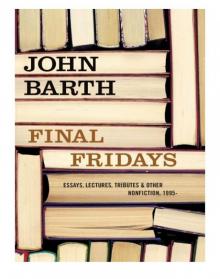 Final Fridays
Final Fridays Where Three Roads Meet: Novellas
Where Three Roads Meet: Novellas Every Third Thought: A Novel in Five Seasons
Every Third Thought: A Novel in Five Seasons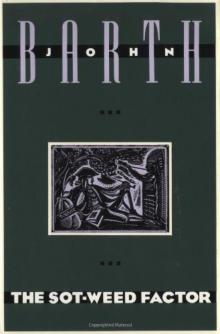 The Sot-Weed Factor
The Sot-Weed Factor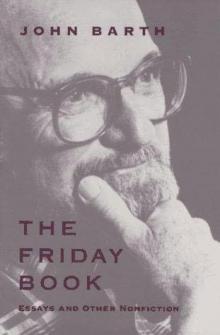 The Friday Book
The Friday Book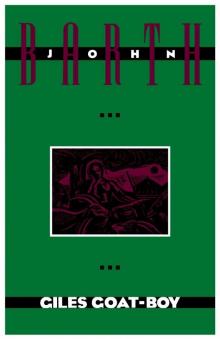 Giles Goat Boy
Giles Goat Boy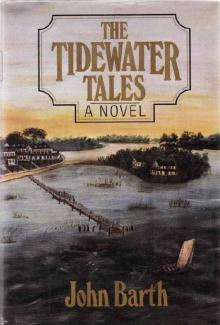 The Tidewater Tales
The Tidewater Tales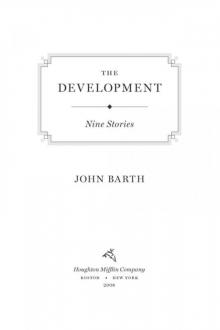 The Development
The Development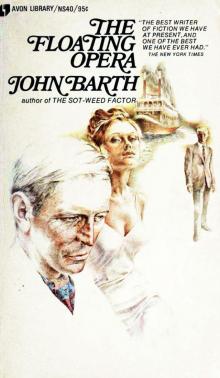 The Floating Opera
The Floating Opera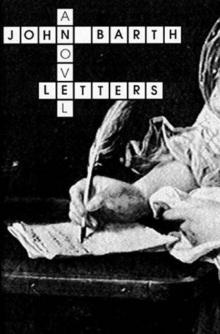 Letters
Letters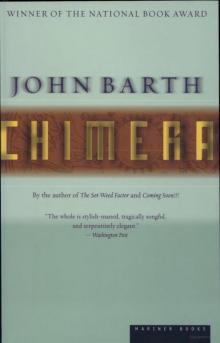 Chimera
Chimera Where Three Roads Meet
Where Three Roads Meet Every Third Thought
Every Third Thought